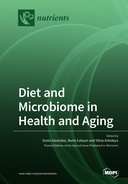Explore

Diet and Microbiome in Health and Aging
0 Ungluers have
Faved this Work
Login to Fave
Diet plays a fundamental role in shaping the composition and metabolic activity of the gut microbiota and, thus, it could determine the interrelationship between the gut microbiome and the host. The colon is the part of the human body that is most densely populated, containing bacteria, archaea, viruses, and some unicellular eukaryotes that have co-evolved with humans in a commensal way. The gut microbiota plays a crucial role in the maintenance of normal host physiology. The rapid development of next-generation sequencing (NGS) methods for DNA sequencing in the last decade has facilitated in-depth study of gut microbiome composition and function. These methods have contributed to providing evidence regarding the relevance of the intestinal microbiota for host health as well as the basis for putative dietary interventions aimed at counteracting microbiota dysbiosis. Understanding the complex and dynamic interaction between dietary exposures and gut microbiota can help to elucidate their potential role in different pathologies and to guide future strategies for the prevention and treatment of diseases. Age-related changes in the gut microbiome are also associated with physiological changes in the gastrointestinal tract as well as in dietary patterns, with a concomitant decline in the normal function of the immune system that may contribute to increased risk of infection and frailty. More studies are needed to better understand how the microbiota shifts with different environmental factors and how they are associated with dietary changes.
This book is included in DOAB.
Why read this book? Have your say.
You must be logged in to comment.
